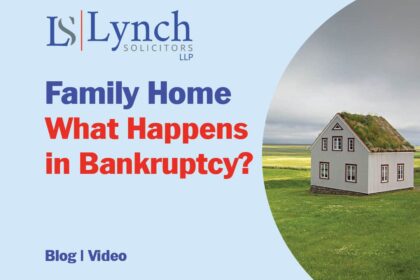
Will I Lose My Home?
Bankruptcy does not mean definitely losing your family home.
If the family home is mortgaged, then in real terms, the bank owns the family home until the mortgage is repaid. The bank may choose to keep the property outside the bankruptcy process and enter into an arrangement with you which would allow you to continue to live there, repay the mortgage and be in a position after bankruptcy to reclaim full ownership of the home once all mortgage payments are made in the future.
What you own before bankruptcy is any value in the home above what is outstanding on the mortgage (this is called the property’s ‘equity’). So if the house is worth €200,000 and the amount owed on the mortgage is €100,000 then you own a positive equity to the value of €100,000.
In bankruptcy, this ‘equity’ is transferred over to the Official Assignee along with all your other assets and debts and you start fresh. This equity can be positive or negative as the value of the home may be less than what is outstanding on the mortgage.
If there is no value in the family home (i.e. you owe more than it is can be sold for), the Official Assignee has nothing to realise for creditors. He will usually agree to release it back to you or your spouse or to allow the Bank to deal with it.
Usually, on the third anniversary of your Bankruptcy, the home will be re-vested in you, unless sold in the Bankruptcy or surrendered to the lender.
Video: Bankruptcy & The Family Home
Lynch Solicitors for Information Purposes Only
Won’t The Lender Choose To Sell The Home?
Banks are commercial enterprises and seek to make a profit. As such, they are likely to choose an option that will yield the best profit for them.
If they will make more money by receiving payments from you over a period of time rather than a once-off lump sum in a sale of the property then they may well to choose that option.
Consider the scenario where the house is only worth €100,000 but the mortgage owed to the bank is €200,000. The bank may well choose to keep the property out of bankruptcy and seek to ‘do a deal’ with you whereby they would get more through regular repayments over a period of time than they would in a once-off sale.
What Will The Official Assignee Allow You To Pay For A Mortgage?
The Official Assignee’s approach has been to allow for the fact that people in bankruptcy need a place to live and whether renting or paying a mortgage, this cost must be considered in calculating how much of their income they are allowed to keep for reasonable living expenses.
What is reasonable for a mortgage repayment is often calculated by looking at what a typical rent would be for a house that meets the needs of the family concerned.
The Bank Wants More Than The Official Assignee Will Allow Me To Pay. Can Someone Else Pay My Mortgage?
If you are fortunate enough to have someone who is willing to pay your mortgage then this is a real option. The mortgage will not be in default and so the bank will not want to sell and the Official Assignee will not usually restrict another person from paying a mortgage on a property.
What Happens If The Home Is Also In My Partner’s Name?
If your partner has no debt but owns a share of the home then they retain their ownership share.
If the property is in negative equity then they may either wait for the house to re-vest in you on the 3rd anniversary of the bankruptcy or offer to buy back the interest you transferred to the Official Assignee in Bankruptcy before that time.
The situation will be complicated if there is equity during the three-year period in the property.
In such circumstances, the assignee in bankruptcy is entitled to apply to the court for an order for sale. In these circumstances, it will be necessary to negotiate with the Assignee to buy out the Bankrupt’s interest.
Is Any Of This Different Because A ‘Vulture Fund’ Now Owns My Debt?
You the debtor are in the same position but simply owe the money to someone else.
Final Word: You Have Options
When it comes to the family home, you have options.
You can vacate the family home which has the effect of writing off any residual debt over the value of the security. This is in effect a voluntary surrender.
You can, with the consent of the bank, remain in the property on the basis of a revised payment arrangement.
Where the family home as a negative equity there have been a number of initiatives – such as the buy to let scheme – to try and keep people in their homes. This option gives the lender the value of the security. The lender/owner then transfers the house to the local authority or other agency who purchases the house from them. That agency in turn enters into a letting agreement with you.
It is therefore critically important to investigate the likely outcome of bankruptcy where the family home is involved and where you may wish to retain the family home.
As always, there are options but these need to be explored in advance.
It is also worthwhile keeping in mind that Personal Insolvency Arrangements are an alternative approach and that you are not required to retain the family home.

